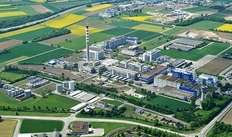- The biomass plant reduces CO2 emissions by 50,000 tons/year.
- The plant generates 267 GWh of steam and 42 GWh of renewable electricity annually.
- DSM aims to cut greenhouse gas emissions by 30% by 2030 compared to 2016.
- The site produces high-quality Vitamin A and E for global customers.

CO2 Emission Reduction
Royal DSM has significantly reduced CO2 emissions at its vitamin production facility in Sisseln, Switzerland, by 50,000 tons per year. This achievement is due to a new biomass heat and power plant built, owned, and operated by ENGIE and Swiss energy provider ewz.
Biomass Plant Capabilities
The biomass power plant supplies steam to DSM Nutritional Products' production facility and other non-DSM sites. It generates 267 GWh of steam and 42 GWh of renewable electricity annually, enough to power 17,500 local households, making it one of Switzerland’s largest and most efficient biomass power plants.
Sustainability Goals
This initiative aligns with DSM’s commitment to reducing 30% of its greenhouse gas emissions from direct production and purchased energy by 2030 compared to 2016. DSM aims to decouple emissions from growth through energy efficiency and increased use of renewable electricity, targeting 75% renewable electricity by 2030, up from 41% in 2018.
Global Vitamin Production
The Sisseln site is the largest vitamin manufacturing site globally, producing high-quality Vitamin A and E (Quali®-A and Quali®-E) for customers worldwide. The investment in sustainability enhances the site's profile by significantly reducing its CO2 footprint.
Additional Initiatives
DSM has set new science-based reduction targets for greenhouse gas emissions, aligned with the Paris climate agreement. Other initiatives include 40% renewable purchased electricity in the U.S. through wind power agreements and 100% renewable purchased electricity in the Netherlands through agreements with wind farms and energy suppliers.

